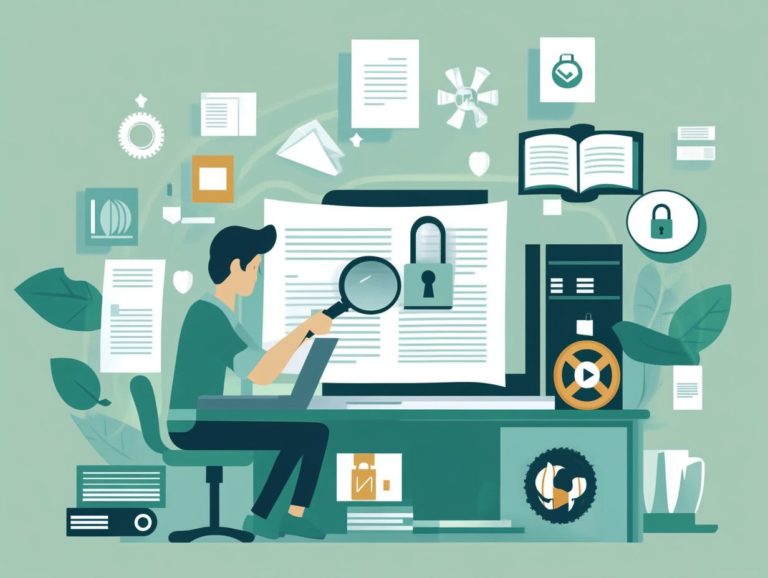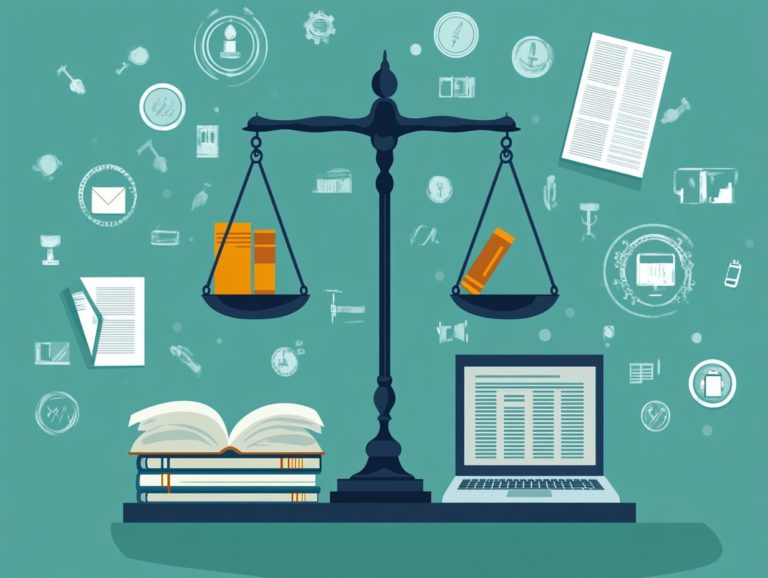How to License Your IP Effectively?
Navigating the realm of intellectual property (IP) can feel overwhelming. However, grasping its intricacies is essential for maximizing your innovations.
This article breaks down the fundamentals of IP, covering its definition, various types, and motivations for licensing. You will be guided through effective steps to license your IP.
We will also provide insights on common pitfalls to avoid during the process. Whether you are a creator, inventor, or business owner, this guide is designed to empower you to capitalize on your intellectual assets.
Dive in and discover how to make your IP truly work for you!
Contents
Key Takeaways:

Understand the different types of intellectual property and their value to your business.
Explore the benefits of licensing your IP, such as generating additional revenue and expanding your market reach.
Follow a thorough process, including conducting an IP audit and identifying appropriate licensees, to effectively license your IP.
Understanding Intellectual Property (IP)
Grasping the nuances of Intellectual Property (IP) is essential for creators, inventors, and business owners. IP encompasses the legal frameworks that shield your intellectual assets think patents, copyrights, trademarks, and trade secrets.
These protections empower you to harness the financial benefits generated by your creativity and innovations. By understanding this landscape, you can commercialize your IP while safeguarding your ownership rights against infringement and unauthorized use.
Definition and Types of IP
Intellectual property (IP) embodies the creations of your mind such as inventions, literary and artistic works, symbols, names, and images used in commerce. These creations fall into various categories, including patents, copyrights, trademarks, and trade secrets.
Understanding these classifications is vital, as they give you control over your innovations and branding strategies. Patents shield your inventions, granting you exclusive rights to use and commercialize your creation for a set period.
This not only protects your work but also encourages innovation by incentivizing investment in research. Copyrights safeguard your original works, ensuring that you can benefit from your labor as an artist, writer, or musician.
They prohibit unauthorized reproduction and distribution, allowing you to reap the rewards of your creativity. Trademarks act as your brand’s distinctive identifiers, helping consumers recognize and trust your goods and services while reducing marketplace confusion.
Meanwhile, trade secrets consist of valuable, confidential business information that enables you to maintain a competitive edge without revealing anything to the outside world.
In essence, each type of intellectual property provides crucial protections that uphold creativity and enterprise in today s swiftly evolving economic landscape.
Why License Your IP?
Licensing your intellectual property (IP) offers a strategic opportunity to unlock the financial benefits of your creations while maintaining ownership rights. This approach lets you capitalize on licensing agreements that can significantly enhance your market potential and generate revenue through licensing fees. To maximize these benefits, it’s important to understand how to protect your IP internationally.
By leveraging your IP this way, you position yourself to reap the rewards of your innovation while controlling the assets you ve developed.
Benefits of Licensing
Licensing your intellectual property opens doors to exciting opportunities! These benefits range from generating revenue through royalties to expanding your market reach all without the burden of direct investment or increased risk.
This approach delivers financial rewards and allows you to focus on your core competencies while exploring new consumer bases. By licensing your IP, you can mitigate some inherent risks tied to product development and market entry.
The decision to pursue exclusive versus non-exclusive licenses is pivotal. Exclusive licenses grant rights to a single entity, often leading to higher royalty rates but limiting your market share.
Conversely, non-exclusive licenses enable multiple parties to utilize the IP, significantly broadening your potential revenue streams and exposure. Ultimately, grasping these nuances can profoundly enhance the economic impact of your intellectual property ownership.
Ready to make the most of your intellectual property? Start licensing today!
Steps to Effectively License Your IP

To license your intellectual property effectively, follow a structured process. Start with an IP audit to clarify your ownership and learn how to navigate IP licensing for artists.
Understand licensing agreements to grasp their nuances. Engage in negotiations that protect your rights and define the licensee’s responsibilities.
1. Conduct a Thorough IP Audit
Your first crucial step is conducting a thorough IP audit. This helps you identify valuable assets like patents, trademarks, copyrights, and trade secrets.
By categorizing each type of intellectual property, you gain insights into their unique values. This understanding helps you pinpoint areas ripe for collaboration or monetization.
2. Determine Your Licensing Goals
Clearly define your licensing goals to align your strategy with market potential. Whether maximizing revenue or expanding reach, clarity is key.
Your objectives will guide negotiations and shape licensing agreements, ensuring both parties understand their rights and responsibilities.
3. Identify Potential Licensees
Research businesses or individuals who can utilize your IP effectively while maintaining your brand’s values. Assess their market presence and operational capabilities.
Establish criteria that align with your mission, like a commitment to quality. Conduct due diligence through interviews and site visits to ensure alignment.
4. Negotiate and Draft a License Agreement
Drafting a licensing agreement shapes your relationship with the licensee. Outline key elements like terms, royalty structures, and responsibilities to protect your rights.
These agreements clarify each party’s expectations and should reflect the IP’s value. Specifying duration and operating territory prevents disputes and promotes harmony.
Common Mistakes to Avoid in IP Licensing

IP licensing can be complex. Be aware of common pitfalls that might lead to challenges. Vigilance is key when it comes to inadequate licensing agreements, misunderstandings during negotiations, and crucial aspects of infringement and enforcement rights that are often overlooked.
By staying informed and meticulous, you can safeguard your interests and ensure a smoother process.
Tips for a Successful Licensing Experience
To ensure a successful licensing experience, establish clear communication regarding licensing agreements. Define enforceable rights and outline your responsibilities as a licensee. This approach fosters a mutually beneficial partnership.
Taking a proactive stance creates an environment where both parties can voice concerns, ask questions, and clarify misunderstandings that arise during the licensing lifecycle.
Reviewing agreements regularly is crucial; it allows timely adjustments that reflect evolving circumstances or industry standards. Set specific intervals for these reviews to stay informed and aligned with your objectives.
When everyone understands their respective rights and responsibilities, it builds a solid foundation of trust. This significantly reduces the likelihood of conflicts that could jeopardize the partnership.
Maximizing the Value of Your IP through Licensing
Maximizing the value of your intellectual property through licensing means strategically commercializing your IP assets and exploring various opportunities. The royalty structure should align with the economic value of your creations while enhancing their appeal.
Assess various potential partners, from manufacturers to retailers, to create pathways for comprehensive engagement. Establishing competitive royalty rates is vital. These rates should reflect market value while incentivizing partners to promote your IP effectively.
By staying attuned to market trends, you can adjust your strategies to seize emerging opportunities. This ensures sustained relevance and maximizes economic impact across industries. These strategies can unlock your IP’s full potential while cultivating long-term partnerships that drive success.
Frequently Asked Questions
What is intellectual property (IP)?
Intellectual property refers to creations of the mind, such as inventions, literary and artistic works, symbols, names, images, and designs. These are protected by law and can be owned or licensed by individuals or businesses.
Why should I consider licensing my IP?

Licensing your IP can offer several benefits, including generating additional revenue, expanding your market reach, and allowing you to focus on other aspects of your business while still profiting from your intellectual property. For more insights, check out our guide on how to license your trademark successfully.
How do I determine the value of my IP?
The value of your IP can vary depending on several factors, such as its uniqueness, market demand, and potential for future growth. It is recommended to consult with legal and financial experts to accurately assess the value of your IP before entering into any licensing agreements.
What are the key elements of an effective IP licensing agreement?
An effective IP licensing agreement should clearly outline the rights and obligations of both parties. The licensor is the person or business that owns the IP, while the licensee is the person or business that uses it. This should include the scope of the license, duration, fees, and any restrictions or limitations. For guidance on how to protect your rights in a licensing agreement, provisions for dispute resolution and termination of the agreement are also essential.
How can I protect my IP while licensing it?
To protect your IP while licensing it, it is crucial to have a comprehensive and well-drafted licensing agreement in place. Additionally, understanding the process for IP licensing can be beneficial. Consider registering your IP with the appropriate government agencies to establish legal ownership and protect against infringement.
Start reviewing your agreements today to protect your IP!
What are the potential risks of licensing my IP?
Licensing your intellectual property (IP) can be exciting, but it comes with risks! You might lose control over it and face disputes over ownership or infringement. To safeguard your rights, it’s important to understand how to protect your IP internationally.
There is also a risk of damage to your brand or reputation if the licensee misuses the IP. Consider these risks carefully and address them in the licensing agreement.






